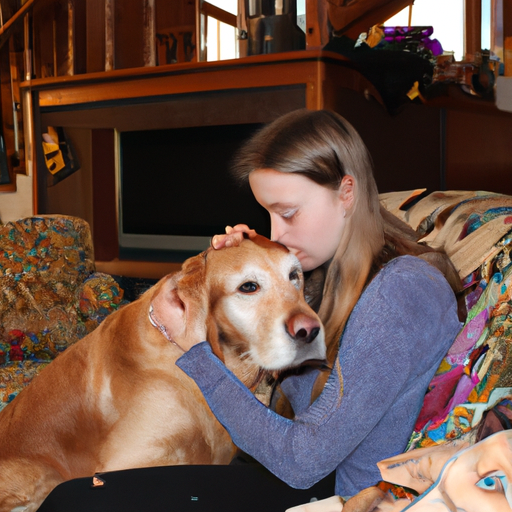Introduction
Have you ever had one of those days when you’re feeling down, and your dog seems to notice? They might nuzzle against you, or perhaps they just sit with you, their presence a silent comfort. It’s as if they are able to sense your mood, but is that truly possible? Can dogs really tell when you’re sad? To answer this question, we’ll delve into the scientific evidence, the ways dogs may pick up on our emotions, and how we can better communicate with our four-legged friends.
1. The Science Behind Dogs Sensing Our Emotions
According to various studies, dogs do seem to respond to human emotions. But how can we be sure? One study conducted by the University of Lincoln and the University of Sao Paulo found that dogs could match expressions of emotion in humans and dogs. This indicates a level of empathy, suggesting they could indeed perceive when you’re sad[^1^].
Another study from the University of Vienna demonstrated that dogs can differentiate between different emotional sounds, such as crying and laughing. They were more likely to respond with behaviors indicative of understanding and empathy – such as approaching or comforting – when they heard sad sounds[^2^].
| ^ Study | Findings |
|---|---|
| University of Lincoln and Sao Paulo | Dogs can match expressions of emotion |
| University of Vienna | Dogs can differentiate emotional sounds |
2. How Might Dogs Sense Our Emotions?
Dogs are incredibly intuitive and attentive creatures. They pay close attention to our body language and our tones of voice. They might notice if you’re not as active, if your voice is flat or quiet, or if you’re spending more time sitting or lying down. All these could be signals to your dog that you’re not feeling your best.
Furthermore, dogs have an extraordinary sense of smell. Some experts suggest that dogs can smell our emotions – quite literally! Changes in our body chemistry, such as increased adrenaline or the release of certain hormones, can alter our scent, and dogs may be able to pick up on these changes.
3. How Can We Communicate Our Feelings Better to Our Dogs?
To improve communication with your dog, try to be consistent with your body language and tone of voice. Dogs thrive on consistency and routine. If your mood is changing and you’re feeling sad, be mindful of the signals you’re giving to your dog. Remember, they’re trying to understand and respond to your emotions.
Here are some tips:
- Try not to drastically alter your routine. Dogs find comfort in predictability.
- If you’re feeling down, it’s okay to seek comfort from your dog. They’re there for you.
- But remember, dogs are not therapists. While they can provide comfort, they can’t solve your problems.
- Reinforce positive interactions. If your dog is behaving empathetically, reward them.
4. The Limitations of Dog’s Emotional Understanding
While dogs are astoundingly empathetic and can pick up on our feelings, it’s important to remember they are not human. They do not have a full understanding of human emotions. They can’t understand the complexities of our emotional lives, and they can’t provide the kind of emotional support a human could.
5. Building a Stronger Bond with Your Dog
Understanding that your dog can sense your emotions is just one more reason to build a strong, trusting relationship with your furry friend. Be patient, be consistent, and remember that they’re doing their best to understand and respond to you.
Frequently Asked Questions
Q: Can dogs sense other emotions, like happiness or anger?
A: Yes, dogs can also sense other emotions. They may wag their tail more when you’re happy, or they might retreat if you’re angry.
Q: My dog doesn’t seem to react when I’m sad. Does that mean they don’t care?
A: Not necessarily. Every dog is different. Some may not know how to respond, or they may respond in ways we don’t recognize.
Q: Can dogs smell fear?
A: It’s possible. Dogs have an extraordinary sense of smell and can pick up on subtle changes in our body chemistry.
Q: Can training my dog help them understand my emotions better?
A: Training can certainly help improve communication with your dog, but it won’t necessarily make them better at understanding your emotions.
Q: How can I comfort my dog when they’re the one who’s upset?
A: The same way they comfort you! Be there for them. Speak in a soothing voice. Provide physical comfort, like petting or cuddling, if they’re receptive to it.
[^1^]: Albuquerque, N., Guo, K., Wilkinson, A., Savalli, C., Otta, E., & Mills, D. (2016). Dogs recognize dog and human emotions. Biology Letters, 12(1). doi:10.1098/rsbl.2015.0883
[^2^]: Huber, A., Barber, A. L. A., Faragó, T., Müller, C. A., & Huber, L. (2017). Investigating emotional contagion in dogs (Canis familiaris) to emotional sounds of humans and conspecifics. Animal Cognition, 20(4), 703–715. doi:10.1007/s10071-017-1092-8



